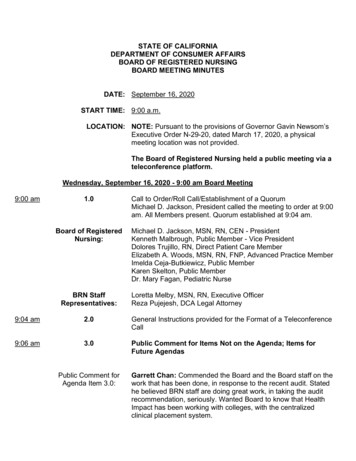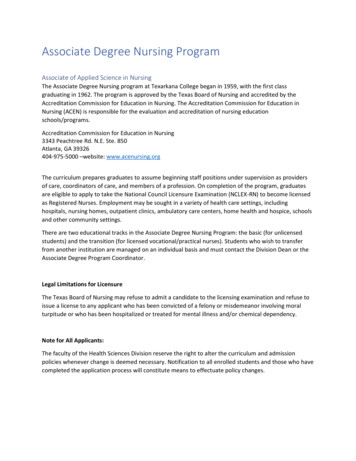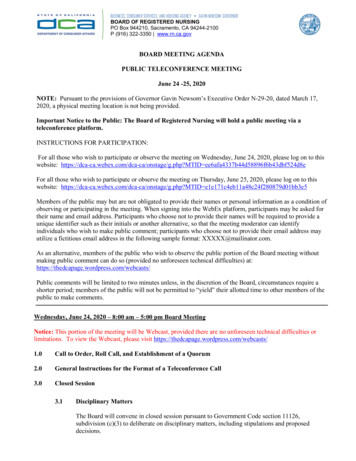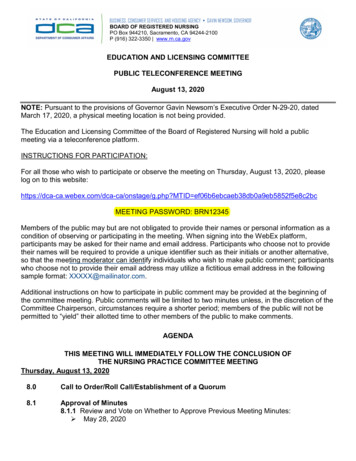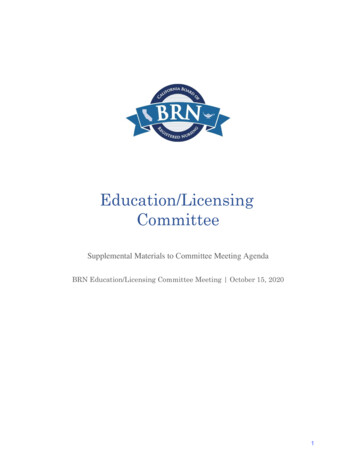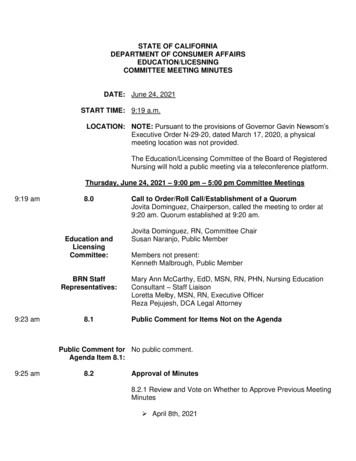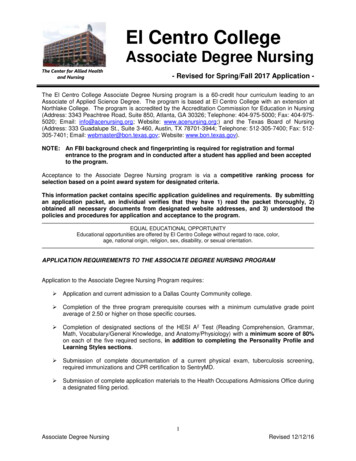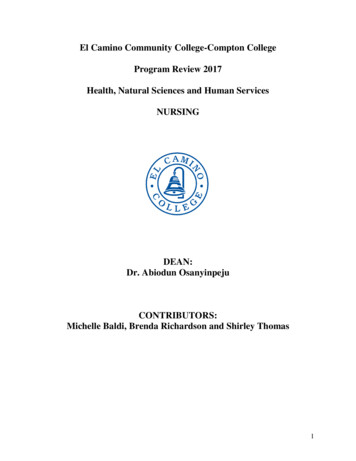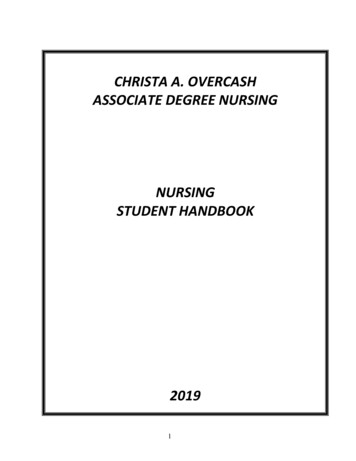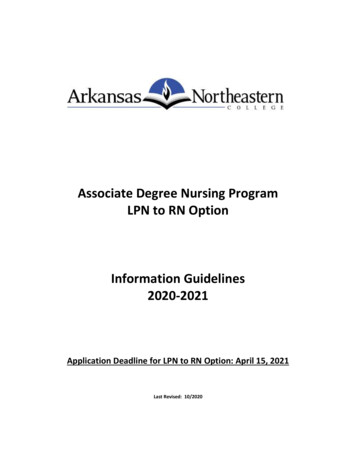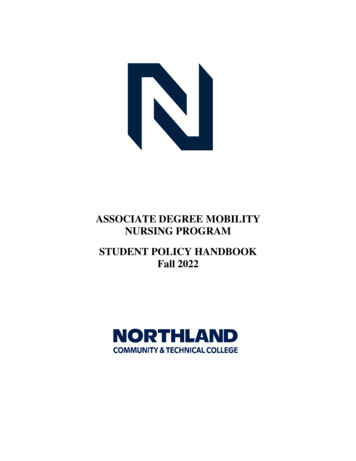
Transcription
ASSOCIATE DEGREE MOBILITYNURSING PROGRAMSTUDENT POLICY HANDBOOKFall 2022
STUDENT POLICY HANDBOOKPersonal CopyofYou are responsible for the contents of this handbook.Additional copies are available electronically on the nursing webpage atwww.northlandcollege.edu/programs/nursing Students with a disability that might affect their performance in this class or who wish to obtain a copyof this document in alternative formats (i.e., braille, large print, or audio tape), please contact theAcademic Success Center (ASC) at (218) 683-8560. An Affirmative Action/Equal Opportunity Educator and Employer. NCTC is committed to a policy ofnondiscrimination in employment and education opportunity. No person shall be discriminatedagainst in the terms and conditions of employment, personnel practices, or access to and participationin, programs, services and activities with regard to race, sex, color, creed, religion, age, national origin,disability, marital status, status with regard to public assistance, sexual orientation, or membership oractivity in a local commission as defined by law.2
Minnesota Board of Nursing Approval:Northland Community & Technical College’s (NCTC) AD Mobility Nursing Program is approved by theMinnesota Board of Nursing (MBON). By Minnesota Statute, the Minnesota Board of Nursing mustapprove nursing education programs conducted in Minnesota that prepare persons to be licensed aspractical and professional nurses. On December 3, 2015, the MBON granted renewal of program approvalto NCTC’s Associate Degree (AD) Nursing Program. This approval continues as long as the ADprogram maintains its national accreditation status with ACEN (see below). Requirements with theMNBON are updated on a yearly basis.Initial approval was accorded by the MBON in 1976 with full approval granted in 1980. The program hashad continuous MBON approval since that date.Minnesota Board of Nursing1210 Northland Drive Suite 120Mendota Heights, MN 55120Telephone: 651-688-1841Nursing.Board@state.mn.usNational Accreditation:We are pleased to announce that the AD Mobility Nursing Program is accredited by the AccreditationCommission for Education in Nursing (ACEN). Continuing accreditation was awarded in July of 2015.Accreditation Commission for Education in Nursing3390 Peachtree Road NE, Suite 1400Atlanta, GA 30326Telephone: 404-975-50003
***Table of Contents***Information. 5A. Mission and Philosophy . 5B. Nursing Framework . 6C. AD Mobility Nursing Student Program Learner Outcomes . 7II.Admission Procedure . 8A. Apply to Northland College: . 8B. Apply to the AD Mobility Nursing Program: . 8C. GPA Requirement: . 8D. Current LPN Licensure: . 8E. IV Competency: . 8F. Current CPR certification: . 8G. Background Study:. 9H. Health Screening Database: . 9I. Entrance Exam: . 11J. Significance of Math .11III.Competitive Admission Procedure. 12A. Point System . 13B. Program Courses. 14C. Competitive Clinical Site Selection: . 15IV. General Program Requirements . 15A. Core Nursing Curriculum . 15B. Performance Standards for Nursing Programs .15C. Attendance . 16D. Classroom Demeanor . 16E. Exam Review. 16F. Early or Late Exam Policy . 16G. Incompletes . 17H. Assessment Technology Institute . 17I. Grading Requirements . 19Late Assignments .20J. Laptop Computers and student email .20K. Requirements for Students Who Fail ANY Nursing Course . 20L. Readmission Policy. 20V.Integrity in Nursing . .20A. Academic Honesty .21B. Social Networking .21C. Intellectual Property .21VI. Academic Termination from Nursing Program .22VII. Clinical Requirements and Responsibilities . 23A. Release of Information for Clinical Sites: . 23B. Professional Boundaries in Clinical . 23C. Confidentiality in Clinicals . 23D. Professional Liability Insurance . 24E. Health Insurance . 24F. Health Screening . 24G. Dress Code . 24H. Allergy. 25I. Blood Borne Pathogens . 26J. Exposure Incident . 26K. Transportation and Expenses Related to Clinical . 26L. Mandatory Clinical Attendace . 26M. Illnesses and/or injuries . 28VIII. Professionalism . 29A. Expectations for Professional Conduct in AD Nursing Program 29B. Unsatisfactory Behaviors in AD Nursing Program: . 29C. Anecdotal Notes . 30D. Consequences of Unprofessional Behavior. .33IX. Nursing Quality Improvement Committee . 33X. Student Complaints & Appeals . 34XI. Data Disclaimer and Policy Changes . 35I.4
APPENDIX A: Requirements for Unsuccessful Courses/Program .36APPENDIX B: Code of Ethics for Nurses . 38APPENDIX C: Documents 39APPENDIX D: Course Descriptions . 40APPENDIX E: Faculty Contact Information .41APPENDIX F: Nursing Performance Standards . .42APPENDIX G: Compliance Aggreement .45***NOTE: This handbook is updated a minimum of once per year. It is the student’s responsibilityto adhere to the most current Associate Degree Nursing Program handbook/policies***I.InformationWelcome to Northland Community and Technical College's Associate in Science Degree (AD) MobilityNursing Program. Northland Community and Technical College offers an associate in science degree thatqualifies the graduate to take the NCLEX-RN, the national licensing examination to become a registerednurse. The program admits only licensed practical nurses (LPNs) and is designed to be completed in twoor three semesters.This AD Student Policy Handbook is intended to provide information needed to experience success in theprogram. It contains the policies and procedures that relate to many aspects of your life as a nursingstudent at NCTC, in and out of the classroom. You are responsible for following the policies on thesepages. Keep this handbook close at hand, as you will need to refer to it often during the entireprogram. As you look for answers to your questions, the nursing faculty can be a great resource. Othersources of information include the NCTC online student handbook, the online college catalog, coursesyllabi, and student services personnel.The AD Mobility Nursing Program adheres to the policies in these documents and reserves the right tomake changes through committee action. Please keep informed. Changes will be posted online on thenursing webpage and via email to students within the program.The NCTC Nursing Coordinators are Kari Koenig, MS, RN (AD Mobility Nursing Program Director) andDorinda Sorvig, MS, RN (PN Program Director). The AD Mobility Program is located on two campuses.The EGF program address is: 2022 Central Ave NE, East Grand Forks, MN 56721. The TRF programaddress is: 1101 Highway One E., Thief River Falls, MN 56701.Kari Koenig can be contacted at 218-793-2524 or by email at: kari.koenig@northlandcollege.edu.Dorinda Sorvig can be contacted at 218-683-8736 or by email at: dorinda.sorvig@northlandcollege.eduThe supervising Dean is Stephanie LeDuc, MBA. She can be contacted at 218-793-2609 or by email at:stephanie.leduc@northlandcollege.edu.A. Mission and PhilosophyThe mission of the NCTC Nursing Program is to serve learners, society, and particularly the regionthrough a collaborative approach in the educational preparation of nursing personnel.The NCTC Nursing Program functions in conjunction with the mission and vision of NCTC. NCTC’sAD Mobility Nursing Program has multiple campuses and modes of delivery which are committed toinspire student success and cultivate a quality educational environment.The educational philosophy of the AD Mobility Nursing Program incorporates the seven core values ofthe National League for Nursing Competencies Framework which includes caring, diversity, ethics,5
excellence, holism, integrity and patient centeredness (NLN, 2010).” “These core values assist infostering students’ development of human flourishing and nursing judgment. All nurses should displayintegrity, respect diversity in all forms, uphold given legal and ethical responsibilities and strive forexcellence while promoting caring, holistic, patient centered care” (NLN, 2010).The AD Mobility Nursing Program supports education as a life-long process incorporating a spirit ofinquiry, supported by evidence-based research. The faculties agree that students need to developnursing judgment in their practice, develop a professional identity as a nurse and learn to supportpatients and families in development of their ongoing growth as human beings utilizing teamwork andcollaboration. Life-long learning consists of acquiring knowledge, demonstrating proficient skills,developing ethical attitudes and values and initiating continuous quality improvement. This alsoincludes maintaining safety standards and utilizing informatics to enhance patient safety.Learning is fostered by individuals who are self-motivated, self-directed, and are active participants in thelearning experience. This is best achieved in an educational environment that encourages creativity witha spirit of inquiry and recognizes each learner’s uniqueness.B. Nursing FrameworkThe NCTC AD Nursing Programs framework was developed by the National League for Nursing CouncilCompetency Work Group in 2010.The model consists of the following components:“1. Core Values: Seven core values, implicit in nursing’s historic paradigm, are foundational for allnursing practice. These values are caring, diversity, ethics, excellence, holism, integrity, and patientcenteredness. They are shown at the root of the model, to indicate that each type of nursing program andeach type of competency must be grounded in each of these fundamental values.2. Integrating Concepts: Emerging from the seven core values are six integrating concepts – namely,context and environment; knowledge and science; personal and professional development; quality andsafety; relationship-centered care; and teamwork. These concepts are shown as bands around theprogram types, illustrating their progressive and multidimensional development in students during theirlearning experiences. The critical feature of the bands is an enveloping feedback mechanism thatacknowledges the ongoing advancement of nursing education, as new graduates return new learning,gleaned from multiple sources, to nursing practice through nursing education. In this way, nursingpractice and nursing education remain perpetually relevant and accountable to the public and all those inneed of nursing.3. Student Learner Outcomes: The goals of nursing education for each type of nursing program can besummarized in four broad program outcomes. Nurses must use their skills and knowledge to enhancehuman flourishing for their patients, their communities, and themselves. They should show soundnursing judgment and should continually develop their professional identify. Finally, nurses mustapproach all issues and problems in a spirit of inquiry. All essential program-specific core nursingpractice competencies and course outcomes are subsumed within these four general aims.4. Nursing Practice: “Unbounded by any closed structures, the four program outcomes converge intonursing practice depending on the program type” (National League of Nursing, 2010).The NCTC AD program outcomes incorporate the four broad outcomes from the National League forNursing Framework (Human Flourishing, Nursing Judgment, Spirit of Inquiry, Professional Identify)6
along with the six outcomes from the Quality and Safety Education for Nurses Project (QSEN) includingpatient centered care, teamwork and collaboration, evidence based practice, quality improvement,informatics, and safety (http://www.qsen.org).National League of Nursing, (2010). Outcomes and competencies for graduates of practical/vocational,diploma, associate degree, baccalaureate, masters, practice doctorate, and research doctorate programs innursing.C. AD Mobility Nursing Student Program Learner Outcomes1. NLN (Human Flourishing): Advocate for patients and families in ways that promote their selfdetermination, integrity, and ongoing growth as human beings.2. QSEN (Patient Centered Care): Recognize the patient or designee as the source of control and fullpartner in providing compassionate and coordinated care based on respect for patient’s preferences,values, and needs.3, NLN (Nursing Judgment):Make judgments in practice, substantiated with evidence, that integratenursing science in the provision of safe, quality care and that promote the health of patients within afamily and community context.4. QSEN (Safety): Minimize risk of harm to patients and providers through both system effectivenessand individual performance.5. QSEN (Informatics): Use information and technology to communicate, manage knowledge, mitigateerror, and support decision making.6.NLN (Professional Identify): Implement one’s role as a nurse in ways that reflect integrity,responsibility, ethical practices, and an evolving identity as a nurse committed to evidence-based practice,caring, advocacy, and safe, quality care for diverse patients within a family and community context.7. QSEN (Teamwork and Collaboration): Function effectively within nursing and inter-professionalteams, fostering open communication, mutual respect, and shared decision-making to achieve qualitypatient care.8. NLN (Spirit of Inquiry): Examine the evidence that underlies clinical nursing practice to challenge thestatus quo, question underlying assumptions, and offer new insights to improve the quality of care forpatients, families, and communities.9. QSEN (Evidence Based Practice): Nursing Integrate best current evidence with clinical expertise andpatient/family preferences and values for delivery of optimal health care.10. QSEN (Quality Improvement): Use data to monitor the outcomes of care processes and use improvement7
methods to design and test changes to continuously improve the quality and safety of health care systems.II. Admission ProcedureA. Apply to Northland Community & Technical College:If you have never been a student at NCTC, then you must apply before completing the application tothe AD Mobility Nursing Program.B. Apply to the AD Mobility Nursing Program:Once a student has been accepted to the college, he/she can then apply as a candidate for the ADMobility Nursing Program. Applications must be received by February 28 to be considered forpriority admission for the fall full-time program and by September 30 to be considered for priorityspring part-time program. Students applying for admission to the AD Mobility Nursing Program arechosen competitively.C. GPA/Math Requirement:To be eligible for the AD Mobility Nursing Program a student must have a total cumulative GPA of2.5 or higher (this includes courses taken at NCTC if the student has taken 12 credits. If they havetaken less than 12 NCTC credits, courses taken at all previous colleges will be included as well).A student must be in good academic standing which means the student has successfully completed aminimum of 67% of cumulative attempted credits. Credits for which a grade of “W” is received areconsidered attempted credits but not successfully completed for the purpose of monitoringsatisfactory academic progress. A “W” does not impact GPA but does negatively impact thecumulative completion percentage. Students on academic warning, academic probation or academicsuspension will not be eligible for the AD Mobility Nursing Program. An Advanced AlgebraFunctions (AAF) score of 230 - 249 score or a Quantitative Reasoning, Algebra, and Statistics (QAS)score of 250 – 300 are required to be considered for admission to the program.D. Current Licensed Practical Nurse (LPN) Licensure:All students must maintain a current LPN license.New PN graduates that graduate the month prior to the start of the AD Mobility Nursing Programhave six weeks from the start of the semester to obtain their licensure.All students must maintain a current LPN license from either the United States or Canada throughoutthe program. Should an LPN’s license become encumbered, suspended, or revoked while enrolled inNCTC’s nursing program, that student will be barred from clinical nursing courses and unable toprogress in the nursing program.E. IV Competency:IV Competency is required prior to being admitted to the nursing programAn Intravenous Therapy Course documented on a transcript. PNSG 1232, Advanced IV TherapyCourse (1 credit) or PNSG 1278/1279 Invasive Nursing Therapies ORA certification of completion of an approved state board of nursing IV course ORDocumentation from an employer that the student is competent in IV technical skills.F.Current CPR certification:Proof of current Cardiopulmonary Resuscitation (CPR) certification including infant, child, adult, oneperson, and two person CPR is required prior to all clinical courses. Accepted certifications includeCPR for the Healthcare Provider or Basic Life Support by the American Heart Association OR CPRfor the Professional Rescuer by the Red Cross. Students who do not have a current CPR certification8
will not be allowed to participate in clinical and will need to make up the clinical day(s) missedaccording to AD Mobility Nursing Program’s Clinical make up policyG. Background Study:It is mandatory to complete the Minnesota Department of Human Services Licensing DivisionBackground Study and the approved National Background study after acceptance to the program.Minnesota law requires that any person who provides services that involve directcontact with patients and residents at a health care facility licensed by the Minnesota Department ofHealth have a background study conducted by the state. An individual who is disqualified fromhaving direct patient contact as a result of the background study, and whose disqualification is not setaside by the Commissioner of Health, will not be permitted to participate in a clinical placement in aMinnesota licensed health care facility. Failure to participate in a clinical placement required by theacademic program would result in ineligibility to qualify for a degree in this program. Evidence ofapproval to provide health care must be on file to be eligible to begin the AD Mobility nursingprogram. The cost for the Minnesota Background Study is 20 which is charged to the studentthrough fees. The student is responsible for the cost of the required fingerprinting ( 9.10). Theinstructions for the MDH background study are handed out to students at pre-orientation meetingsonce accepted into the program. The instructions can only be provided for each student after collegenursing personnel verify student identification by visualizing the student’s photo ID. The nationalbackground study will cost approximately 50 which is paid directly by the student at the time ofcompleting the study.Minnesota and National Background studies for the AD Mobility Nursing Program will be completedupon admission to the program. The National background study will be completed annually prior toits expiration date.H. Health Screening Information via a NCTC approved tracking system:To protect the health of students, patients, employees and others, and to comply with standardsestablished by the affiliated healthcare providers, the College requires all students enrolled in a Healthand Human Services Program (HHSP) to provide dates of current immunizations against certainvaccine preventable diseases, and date and results of current tuberculosis (TB) screening before thestudent is eligible to participate in clinical training, unless an exception applies. Health and HumanServices students must comply with both Minnesota law and clinical facility requirements related toimmunizations and background screenings. Students who do not comply with the required health andimmunization requirements may not be permitted to attend clinical, which WILL affect programprogression and completionStudent immunizations will be tracked through an approved data base. Students are required to createan account (at the cost of 45.00) and keep all immunizations current through the data base.Clinical health requirements include:Health and immunity requirements include but are not limited to: Diphtheria/tetanus required within the last 10 years. Healthcare students are encouragedto obtain a Tdap booster ASAP if they have not had one previously (regardless of when theirlast Td booster took place). Either a negative two step Mantoux test OR a negative Interferon Gamma Releases Assay(IGRA) blood test (upon entering the program) or- Chest x-ray if student has experienced a positive TB along with a letter from ahealthcare provider indicating they are medically cleared to provide direct patient care.9
- After entering the program students must complete an annual TB risk assessment.Two doses of MMR or- Evidence of immunity against rubella, rubeola and mumpsTwo doses of varicella (chicken pox) vaccine or- Evidence of immunity against varicella (titer).Three doses of Hepatitis B vaccine or- Evidence of immunization against Hepatitis B virus- Evidence of immunity against Hepatitis B.Annual vaccination for seasonal influenza.Annual signature on the student statement of understanding (Blood Borne Pathogen)Annual signature on the clinical consent formCovid Vaccination: All student to follow facility specific requirementsCurrent CPR Certification:As a nursing student, you will come in contact with patients that range from infants to the elderly.Because of this, you must certify in a CPR/Basic Life Support course that includes a paper penciltest and hands-on skills verification of competency of the following: 1 and 2-Rescuer CPR (adult, child, infant) AED use (adult, child) Bag-mask use (adult, child, infant) Rescue breathing and choking (adult, child, infant)CPR certifications accepted include; CPR for Health Care Providers or Basic Life Support forHealth Care Providers (American Heart Association) or CPR for the Professional Rescuer (RedCross.)Submit your documentation verifying current CPR verification to your data base for approvalPlease see Allied Health & Human Services web page for more detailed programs/immunization.php All required forms can be foundhere.All pregnant students should consult their obstetrician before receiving HBIG, hepatitis B vaccine or anyviral vaccine.Students not current in any of the health requirements will not be allowed to participate i
nursing webpage and via email to students within the program. The NCTC Nursing Coordinators are Kari Koenig, MS, RN (AD Mobility Nursing Program Director) and Dorinda Sorvig, MS, RN (PN Program Director). The AD Mobility Program is located on two campuses. The EGF program address is: 2022 Central Ave NE, East Grand Forks, MN 56721. The TRF program
